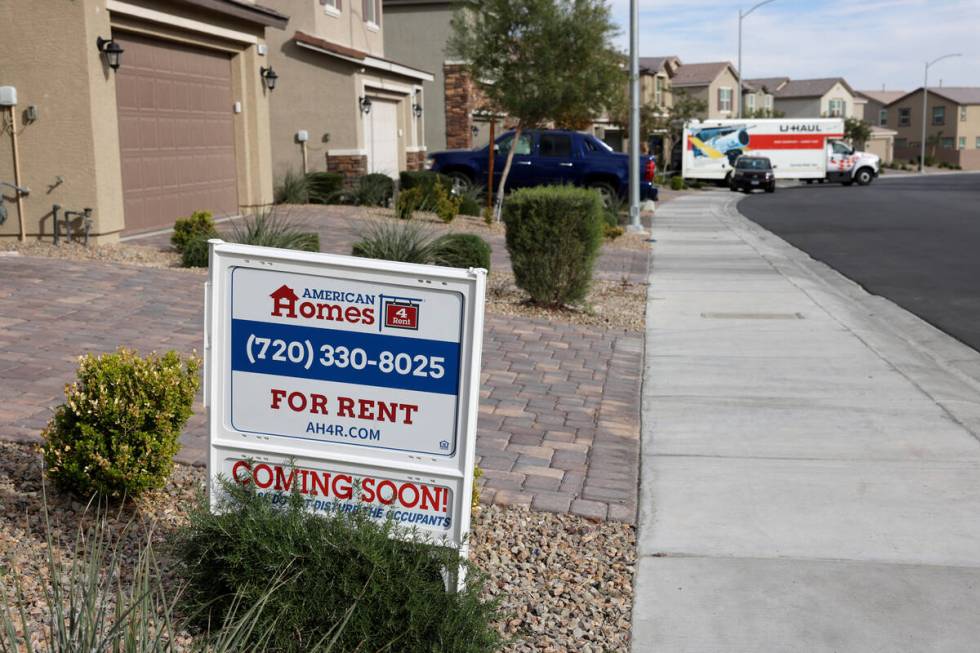‘It’s ridiculous’: Rising housing costs are pinching Las Vegas Valley residents

Jair Guigui knows all too well about Las Vegas’ housing crisis.
His sister recently moved in with him due to rising rental rates, and the 20-year-old said his parents, who were undocumented immigrants, were taken advantage of by a landlord which caused a number of health issues and forced them to move in with his older sister.
Guigui, who is a housing justice organizer for the Progressive Leadership Alliance of Nevada, a nonprofit that works to help the local community’s most vulnerable citizens on a number of issues, said his story is one he is hearing all too often in Las Vegas.
‘Rents are ridiculously high’
Working class citizens, those who have full-time jobs and gainful employment are now being squeezed by the local housing crisis. The average household in the valley now needs to make above the median income just to afford the average rent, and well over $100,000 to afford a mortgage payment.
“Rents are ridiculously high and everything is skyrocketing, our wages are not increasing but our rents are,” said Guigui, adding that housing costs is easily the top issue on everybody’s mind right now in 2024.
“People are trying to decide if they should put food on the table or if they should pay rent. They are being forced to choose between eating and putting a roof over their head. And then these corporate landlords come in and buy everything up, they bought 264 homes in one day.”
Guigui is referring to a Las Vegas Review-Journal investigation which uncovered that a Wall Street-backed corporate landlord bought hundreds of Clark County homes in a staggering one-off residential sale in summer 2023. Miami-based investment firm Starwood Capital Group sold 264 homes in Clark County for $98 million to Dallas-based Invitation Homes (NYSE: INVH), according to Clark County property records.
Nevada is short more than 78,000 affordable rental units for extremely low-income renters, according to estimates from the National Low Income Housing Coalition, and a recent study found that Las Vegas Valley residents would have to save up for more than 17 years to afford a down payment for a house right now, according to a new study from Zillow.
Guigui said the valley’s most vulnerable are starting to give up on one of the tenants of the country as a whole.
“We grow up with this idea of the American dream of owning your home, owning a car and living in that home and being stable,” he said. “A lot of people are not feeling that right now, not feeling that stability.”
Politicians are taking notice
Politicians are clearly taking notice as housing has become a prime issue for constituents. U.S. Rep. Steven Horsford, D-Nevada, and Sen. Jacky Rosen, D-Nevada, sent a joint letter last week to the Department of Housing and Urban Development asking for Southern Nevada’s Housing Choice Vouchers allocation to be increased by 10,000 vouchers over five years. The vouchers provide reduced rent for very low-income residents.
In the letter, both Horsford and Rosen took aim at what has become a top issue, a growing “affordability crisis” that is having a “disproportionate impact on some of our most vulnerable populations: low-income families and seniors.”
“Affordable housing is a critical issue affecting families in Nevada,” Horsford said.
The letter notes the Southern Nevada Regional Housing Authority has a waitlist of more than 42,000 applications for vouchers, and it would take approximately three years just to clear the backlog at the current rate.
“Hardworking Nevada families are feeling the squeeze of sky-rocketing housing prices, which is why I’m doing everything I can to lower costs and make housing more affordable in our state,” Rosen said.
Rosen also recently wrote another letter to the Secretary of Housing and Urban Development expressing concern “with the impact of corporate investor activity on the availability and affordability of housing in Nevada.”
The letter noted another Review-Journal investigation that outlined a study done by Shawn McCoy, director and associate professor for the Lied Center for Real Estate at UNLV, that found corporate investors own approximately 14 percent of the entire housing stock in the valley, and potentially 25 percent of North Las Vegas specifically.
Guigui said at the end of the day, most people just want to be able to afford to live a comfortable life and “not be taken advantage of.”
“We want to see Nevadans thrive and not just survive,” he said. “People are not able to focus on their families, a lot of people aren’t just working one job, they’re working multiple jobs and I can’t imagine the single parents trying to make it in this economy right now, it’s ridiculous.”
Contact Patrick Blennerhassett at pblennerhassett@reviewjournal.com.